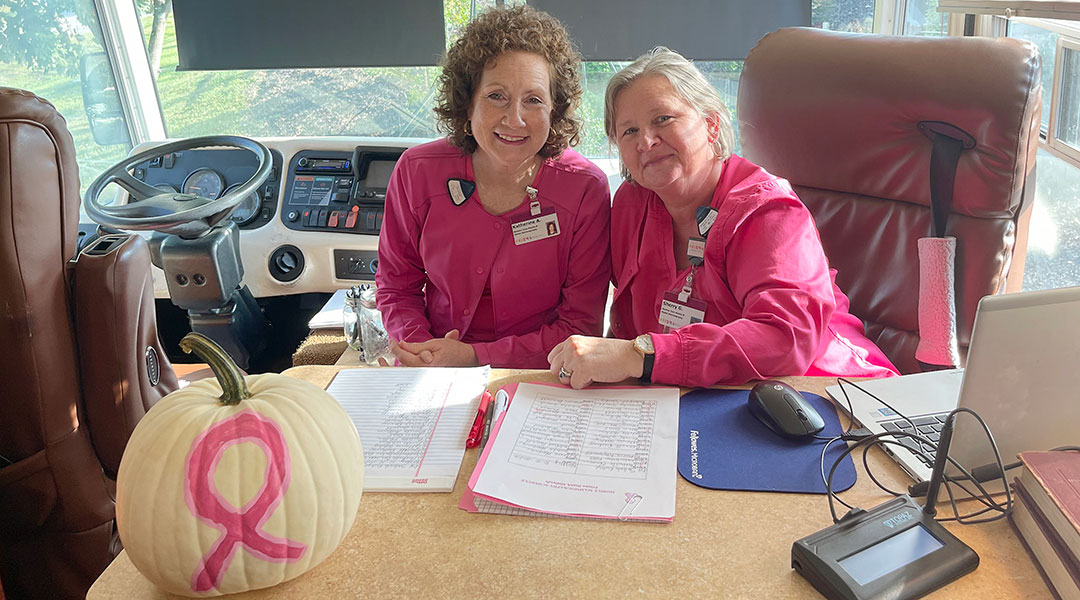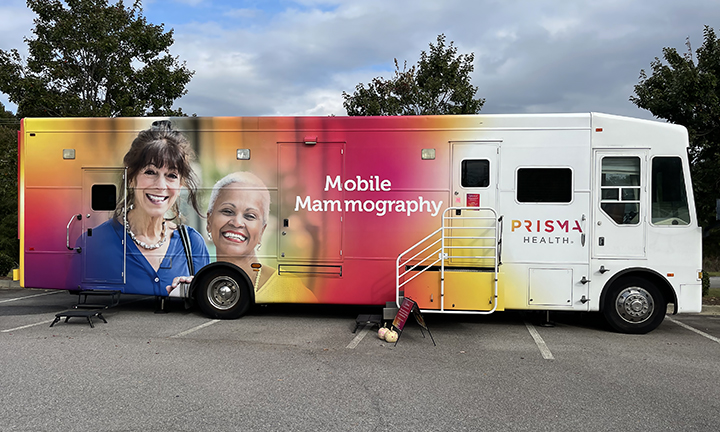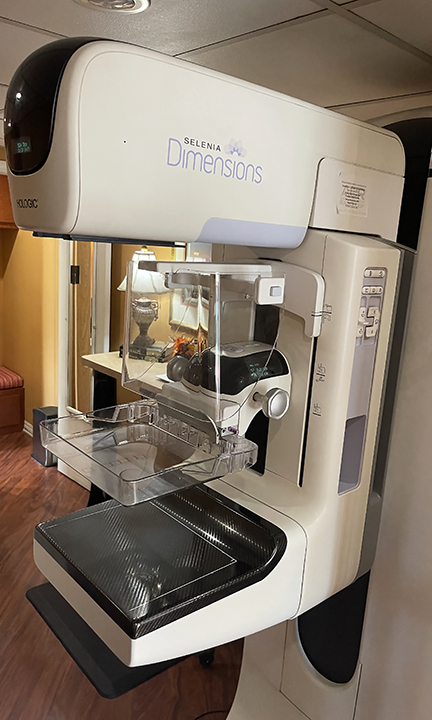Kathy Ayen, left, and Sherry Gibson in Prisma’s mobile mammography unit. Ayen and Gibson have worked in the mobile unit for more than two decades. (Photos by Caity Pitvorec)
Prisma Health’s Midlands mobile mammography unit is almost fully booked through 2023.
The mobile unit, which uses the same mammogram technology from hospitals but on wheels, gives women an accessible opportunity to schedule a routine check for cancerous cells. The convenience of it appeals to patients, and bookings always increase toward the end of the year, in part because October is Breast Cancer Awareness Month.
“People typically don’t want to talk about breast cancer until it’s October,” said Evelyn Barella, the director of integrated marketing for the American Cancer Society’s Southeast region. “We should be thinking of breast health year-round, not just in October.”
Kathy Ayen, the mobile mammography coordinator for Prisma, has worked with the motorhome-style service since it began 30 years ago. She said going to various locations in the community helps reach people who otherwise might not get a mammogram.
“When it’s sitting in the parking lot, it’s like, ‘Oh, I could just pop out there, I’m in and out in 30 minutes, and I’m back to my desk,’” Ayen said. “So I really feel like we save lives that way.”
Two mammographers travel across the Midlands in the mobile unit and park in different locations, such as in school and church parking lots. Twice a year they drive as far away as Conway for county government employees.
Sherry Gibson, who has worked with Ayen and the mobile unit for more than 20 years, is a breast cancer survivor herself. Ayen said they like to call themselves “the mobile-ettes.”
Gibson’s experience with breast cancer helped her connect with patients about the processes and treatments that come with the diagnosis.
“It’s a good thing to be able to see it from the other side,” Gibson said.
Prisma’s emphasis on breast cancer detection has helped with the mobile unit’s growth and accessibility to the community.
The Midlands’ mobile unit was the first in the state to have three-dimensional mammography, which helps radiologists see and detect cancerous cells in people with more dense breast tissue.
Ayen books the unit’s schedule. There are some openings, but not many, in 2023, she said.
“What you want to do is keep these ladies on track,” Ayen said. “They need to be having their mammograms once a year, so I try to reschedule that account for the next year around that time.”
Sue Whitlock, a nurse who works with women when cancer is detected, has been with Prisma for seven years.
“It’s huge in what (the units) are able to do and what they’re able to provide to the community,” Whitlock said.
Breast cancer is the most common cancer diagnosed in women of all races in South Carolina, according to the state’s Department of Health and Environmental Control.
The women said staying on top of routine check-ups is the best way to remain healthy. Women aged 40 and older can get annual mammograms without a doctor’s note, and women younger than 40 can do so with a referral.
It’s simple, Ayen said.
“It can save your life. She’s living proof, ” she said, gesturing to Gibson.
Prisma Health’s mobile mammography unit parked in front of a Prisma Health building. Women with a scheduled appointment enter the van for their mammograms.
Painted pumpkins sit in front of the steps to Prisma’s mobile mammography unit.
The mammogram machine set up in Prisma’s mobile mammography unit. The machine does three-dimensional scans, which helps radiologists detect cancerous cells in more dense breast tissue.
The display at the exit of Prisma Health’s mobile mammography unit. A patient hand made the “Fight-like-a-girl” sign, employee Kathy Ayen said.






